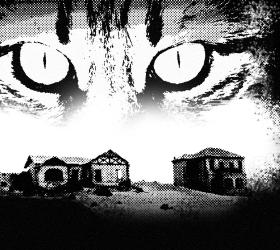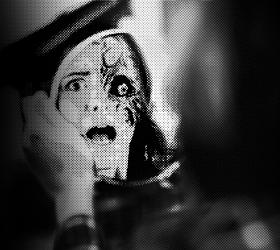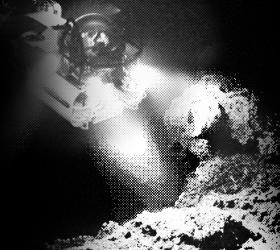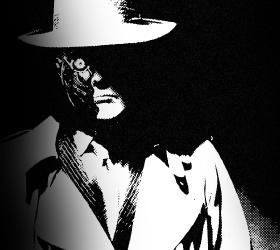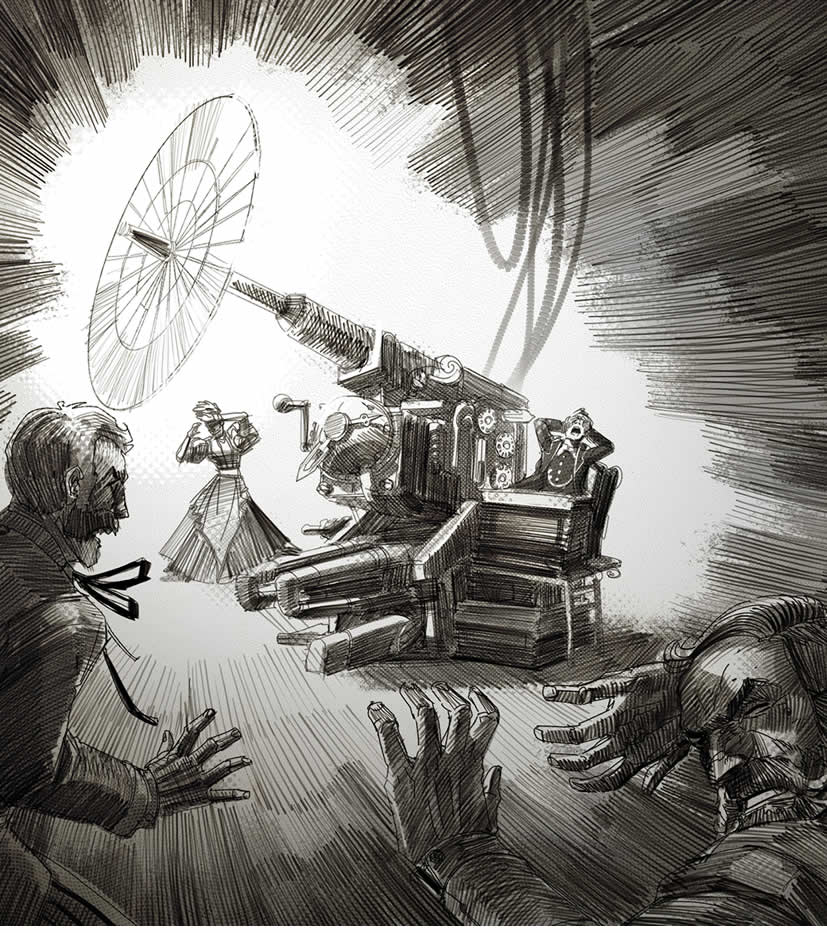
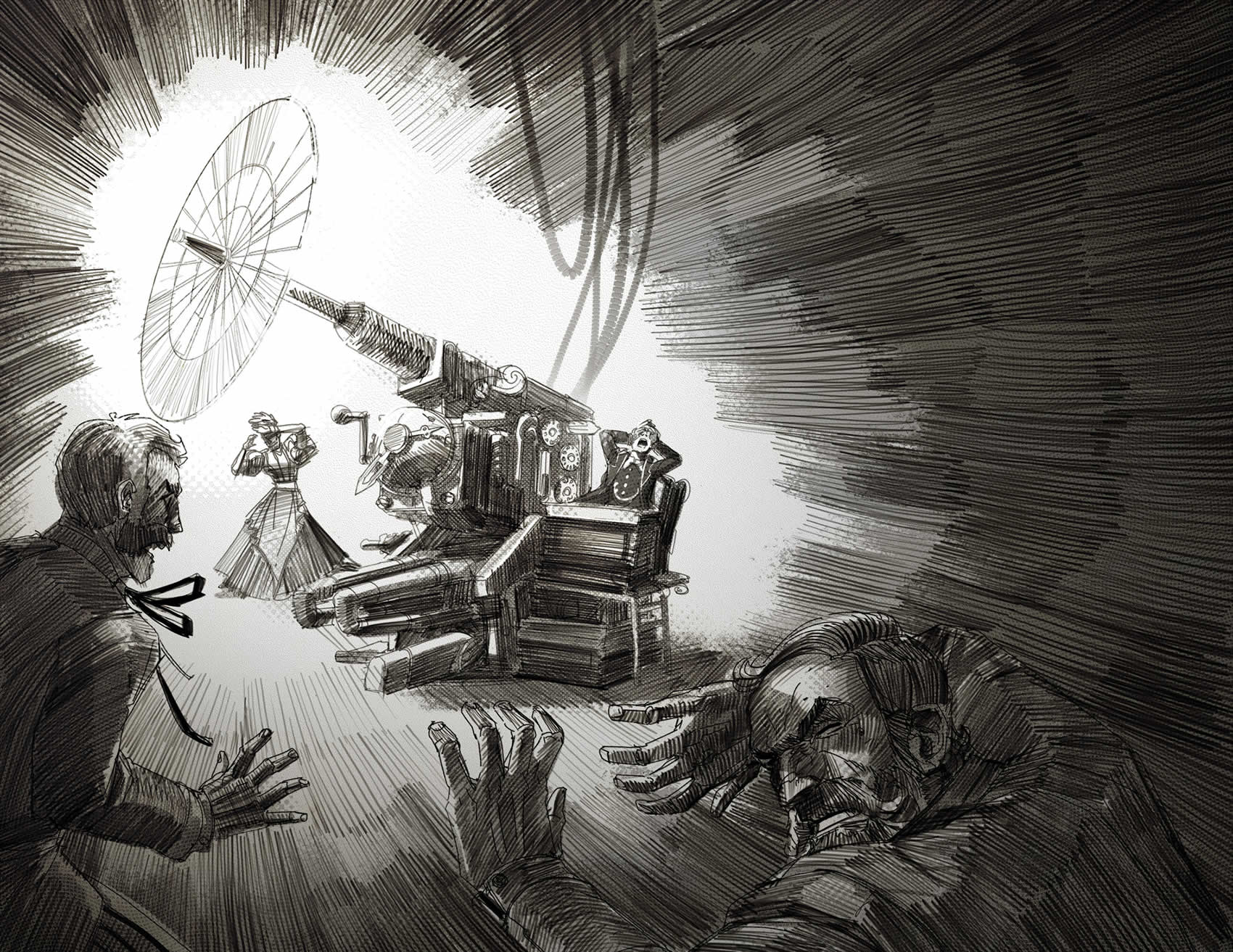
The Rite
They were conducting an experiment, but no one was ready for what they discovered.
Gentlemen of the board, I am well aware of the abuse I have made upon your trust by joining the late Professor Braun in his delirious experiment instead of trying to put a stop to it. I deserve nothing less than the expulsion of this house of studies, that much is clear. But, well knowing the rumors that now weigh on my person, I cannot simply afford to leave without giving my version of the events of that night.
Not as a petty attempt to preserve my good name, but so that the truth about the professor’s work can endure–at least among men of science.
Have you ever wondered about the lives of the men and women who surround our University? Down there, in those fields, have any of you ever spent an evening with those farmers? Or have you done as I have, simply exchanged a quick greet, a friendly nod as we pass next to them on the way back from town?
You see, we proud ourselves of having a long tradition of producing great scholars. Here, in the midst of a hidden paradise, in this forgotten reservoir of the old world. Distinguished jurists, mathematicians, cardinals, archbishops, and philosophers, are all among our most honored alumni.
However, we know as little about the traditions of those living at the edge of this rain forest with us as we know about the reasons the group of scholars who founded this very institution had to flee England.
As some of you might know, Professor Braun was a direct descendant from one of those scholars. He, as I, suspected that the reasons to choose these lands had little to do with King Henry’s blasphemous campaign against the followers of the old religion and more to do with the founders’ own morbid scientific pursuits. That my friend shared that same sickly understanding of science is, in my opinion, solely the fault of the men on his family for having instilled a family tradition out of those archaic experiments.
At around four in the morning, myself and an undergraduate student met as per my friend’s instructions at the gates of his family manor. Alexandra, the local girl, was already waiting to receive us there.
Jeremy is perhaps one of the most applied young engineers I have met, besides one of our students and my direct recommendation to Professor Braun. The girl simply introduced herself as the daughter of the town’s innkeeper, with whom the Professor had an arrangement for help in everyday tasks, such as food and laundry. However, we later found out Braun had especially summoned her because of her knowledge of the stars. Not the same, stars we now know and study, but the ones her ancestors worshipped countless years ago when the constellations in this part of the world were still young.
As we pushed open the enormous rusted gate to make our way across the jungle of uncut grass that surrounds the property, I must confess, I began to become uneasy. I was not aware of the disgraceful condition the professor had sunk his family state. You will understand, then, my concern when I walked into the old mansion finding most of the furniture missing, the walls and floors torn open, stripped from their wood. It was as if a bomb had exploded in the middle of the living room.
 Verified by LinkProof
Verified by LinkProof
Fearing one of his many experiments had ended in a tragedy, I ran to his laboratory upstairs by leaping through the river of cables that converged up the old wooden stairs.
As it turns out, the Professor was well and sound in the large east room of the upper floor. He had his nose buried deep in five large volumes at the time I walked over to his desk. Two I recognized almost immediately, as they were zodiac charts written by one of Rasputin’s own confidants, supposedly copied from the journals of the Russian prophet himself. The remaining three I overheard him mention once or twice to the faculty’s Librarian, but never knew they were the astrological treaties of the English Monk the Venerable Bede until I saw them on the professor’s desk.
At the center of the room, the swarm of wires that I had leaped over down in the living room climbed like a vine through the walls and up the ceiling, then converged inside the mechanical leviathan Braun and Jeremy had been working on and off for the past few months, giving the impression that a giant spider and its web had taken over the interior of the old Braun mansion.
As we all know, watchmaking was among the professor’s most curious hobbies. Not that there was something particularly ordinary about his love for geology, anthropology, photography, electricity, history or any of the other hundreds of interests he pursued. But this machine of his, it really gives testament to the man’s dedication to the extraordinary. It belongs in a museum, where other scientists can study it, learn from it, get inspired by its outstanding complexity, not hidden in some court’s deposit because of what happened.
It wasn’t until I touched my friend’s shoulder that the books released him from their spell. “You are late, Martin!” he said. “Have you brought me what I asked you to?”
“I punched a hole in my pocket to have this last one shipped over the weekend,” I said, handing him the metallic disk with the Portuguese alphabet engraved on it.
He wasted no time in getting off his chair and snapping the metallic dial inside the labyrinth of cogs along with all the others. Once he tested its rotation manually, Braun flipped a switch, stepped back and watched anxiously. The mechanism of the machine began to shriek, then tremble violently and for a moment, blow large clouds of steam, as if it were breathing in the cold air of the house with disgust.
Finally, to Braun’s amusement, once the huge machine had grown accustomed to being on, the disks filled with dialects that shape its guts, began to spin in synchrony along with the one I handed him.
At my friend’s request, I had commissioned some of these discs to be forged in Chaldic, Spanish, Chinese, Russian, Latin, and in every language known to man by different colleagues in linguistics from other universities. Some I had especially laid out with a combination of rare alphabets, like Sumerian with touches of Zend. Others were really curious, like a whole series with the different variations of the sacred tongue of India. He even went as far as to have me create one in a specific language spoken only in the Bactrians that few men know about. They were a work of art on their own; handmade silver Rosetta stones loudly jerking with a clank, back and forth, spinning, dialing, each at its own pace.
After the dials had gone through every possible combination, they automatically rotated back to their starting position and locked themselves there with the sonorous ring of an old wall clock bell embedded in the center of the machine.
Braun’s eyes were of a child. “Finally,” he murmured to himself.
“Now you will tell me why you needed the disks and what this thing is for?” I asked.
He looked up as far as his hunchback allowed him to and smiled, nodding.
“As you know, Martin,” he began, “my loves extend far beyond astrophysics, but not as far as to include linguistics, which is crucial for the success of this enterprise. I’ve already informed Alexandra and Jeremy what will be attempted here today. They both agreed months ago, but since you don’t belong to our department, security measures had to be taken to ensure the integrity of the experiment. Surely, you will understand.”
“An experiment? Is that what this all is for?” I said, “What is it supposed to be, a new kind of telescope?”
He laughed a little. “In a way. Say, Martin, are you familiar with Graham Bell’s photophone?”
“Of course; he devised a mechanism capable of transmitting sounds through a light beam. His most ambitious patent, some might say.”
“And Mr. Bell would be the first one to agree with that statement,” Braun said while he sat on the chair of a wooden student desk attached to one of the sides of the machine. “This machine you see here is the continuation of what Mr. Bell began at the winter of his life. I call it, the Star Whisperer.”
“Sounds like you are building yourself a space rocket here, Professor.”
Braun smiled broadly.
“So, what does it do?”
“It frees us!” he shouted with great anxiety in his voice. “You see, Martin, what you are looking at here is the second Star Whisperer I’ve built. The first one was born two years ago, its actually buried deep inside the entrails of this newer, improved version. One might even say it is its heart!”
While checking over a series of valves and instruments on the small student desk attached to his seat, the Professor signaled Jeremy, who immediately began pulling off all of the curtains letting what was left of the moonlight bathe the vast room.
For some reason, I mistook the strange symbols Alexandra began chalking on the floor around the machine to stellar charts, so I didn’t pay her much attention. While my lack of curiosity at her actions might sound strange now, I assure you that at the time it was not stranger than the colossal clockwork erected in the center of the improvised workshop.
Braun ignored her as well. “It was thanks to my breakthrough in that first, rudimentary version of the Star Whisperer that I was able to broadcast to a device, just like the one over that chair, but that was in my University office! Right through a beam of sunlight!”
“That’s almost two miles away!” I stuttered.
My surprise became so evident that my friend burst into a maniacal laugh. “Two point five miles, Martin. This design, though, can handle a thousand times that distance,” he said, pointing at the large plate with millions of tiny convex mirrors that tiled into a huge cone on the top of the machine.
I shook my head at the notion of such a feat. “Impossible. Surely our atmospheric conditions will degrade any sound within the photons when traveling that far?”
“Not with this new version,” he said, “but that is not where my improvements on Mr. Bell’s invention stop, no. This photophone you see here has the capability of broadcasting and receiving not only sounds, but images as well. All through the same sunlight beam and without the need of another device at the other end.”
“Absurd!” I accused him.
He laughed again.
“Through this visor over here,” he said, patting a sort of copper periscope protruding from the student desk attached to his chair, “I’m capable of picking up images from anywhere sunlight travels to. What we have here is a window into the universe, Martin. Far more powerful than any telescope made in the last fifty years, far clearer too.” I lifted an eyebrow.
“Both are subject to interference, true,” he said, “but man’s brain has evolved into processing images easier than it does with sounds, which is why instead of trying to make sense out of static, I decided to bring someone smarter than me.”
Jeremy smiled.
“This young man devised a mechanism capable of separating the natural atmospheric noise resonating on any light beam, say, from a passing cloud, from the actual audio wavelength of the spoken word. The sound then gets represented phonetically by the letters engraved on the dials you kindly designed for us. Aimed at the right latitude, the Star Whisperer will be able to pick up conversations and images from almost any point in the universe where our sun shines.”
Braun noticed my expression. “Do you understand now, Martin, why we kept it from you? This machine can win wars!”
“If what you say it does is true,” I said, “then it can also create a thousand.”
“Let’s leave that to politicians.” The professor laughed. “And since no one but us has knowledge of its existence, today, the Star Whisperer will see far beyond what Galileo could have dreamed.”
As you know, Braun’s contagious excitement had always been one of his greatest assets, with his students and with the rest of the faculty.
This time was no different.
I ran towards the machine and stuck my head inside its world of springs, pulleys and cogs, marveled at the perfection of its craftsmanship. Despite the countless sketches that have been published by newspapers, none captures the scientific rigorousness that Braun’s majestuous invention deserves. I see myself forced, then, to describe his Star Whisperer, as he baptized it, as detailed as possible:
The machine was made in its entirety out of Coromandel, no doubt taken from Braun’s own family furniture. Roughly twenty-five feet wide and sixteen feet tall, the invention had a similar shape to an anti-aircraft battery, but with the particularity of supporting a large funnel on its front, instead of a barrel. At the end of the funnel there was a conical-shaped mirror made out of intricate tiny cuts of tiles, mimicking the care and meticulous attention to detail one would only expect to find in the decorations of a Persian rug.
The whole construction rested on a platform made from some other kind of wood, a more common kind, with a tablet arm chair desk attached to the base on one side of the machine. On the desk, a multitude of levers, valves and measuring instruments spread out in front of the Professor as an orchestra, waiting for the director to conduct his symphony.
That said, though, the copper periscope is among the most notable of its instruments. Its long tubular shape, twisted from several points of the machine all the way to the controls on the desk, erects itself in a vertical position almost similar to the one of a cobra.
Under a bell, buried deep inside the dark puzzle of brass cogs, the silver dials I’d built could be seen from a considerable distance, as they were lit by two yellowish filament bulbs on each side of the inner walls which constantly flickered. Braun caught me staring at them.
“You must wonder why I commissioned you with those,” he said, reaching for a cigarette from his apron’s big front pocket.
“Sanskrit? Aramaic? Ancient Greek? Esuma, from the Ivory Coast? Just who will you be trying to contact here?” His stare went to the window. “Those living in our sun.”
I can assure you, gentlemen, my surprise was as overwhelming as yours. The irony of being a linguist and finding myself with no words that could be used in the face of such outlandish affirmation left me with no other choice but to turn around and head back to the staircase, but given the colossal undertaking of his enterprise and the many hours I had already invested in the design of the dials, I lament to say that I succumbed to my scientific curiosity. Without doubts, the worst decision I have ever made in my life.
“Professor,” I warned him, “there is nothing you can say to convince me that there are people living in our sun.”
“What about logic, Martin?” he demanded. “Are you going to refuse listening to logic as well?”
I simply stared at him and waited for it to be a joke. It wasn’t.
“Every sacred scroll in history tells us about a singular, unique tongue spoken by men long before we cursed ourselves into nations.”
I grinned at that. “You won’t be talking about the story of Babel, from the book of Genesis, won’t you?”
He was.
I laughed even harder than he before. “That is just a story, man! A myth! Nobody lives in the sun!”
“Wrong!” he claimed, his eyes almost leaving their sockets. “Evidence clearly tells us otherwise!”
“Evidence?” I said, “What evidence could there possibly be?”
“Our own history, Martin! Every culture worshiped the sun, and in every culture the same story appears, again and again through our time line! Nepal, Mexico, Sumer, Africa–all speak about humanity building a tower so tall that it reached out into the heavens and angered the Gods!”
“And they punished men by giving them different languages so they couldn’t work together again.” I laughed. “Yes, I know the story, Professor.”
“Then you realize the possibility.”
“Mere folklore!” I said.
“Think, man, think!”
“A widow’s tale passed on in front of bonfires, nothing more.”
“Nothing more? Look around us, Martin! Science has yet to tell us from where so many languages come from. How would you explain this widow’s tale, as you call it, being passed on from totally different cultures that existed hundreds of miles apart from each other, even across the seas or beyond the poles back when man wasn’t even sailing the oceans?”
As many of us had the opportunity to witness, the Professor was among the stubbornest of men when it came to standing behind one of his theories, so I decided to pass on the challenge. Not for lack of arguments, but again, out of curiosity.
“And this… monstrosity of yours,” I said, “will offer us an explication?”
He nodded. “The Mesopotamians called him Katuzakel, the Chinese named him Yu Hang, the Hebrew Jehovah, the Sumerians An, the Egyptians Ra–all existing in the heavens, all represented by one common symbol–our sun. See, when I began with these broadcasts I caught something floating…” he paused to whisper, “in the sunlight.”
He motioned me to come closer.
“At first I thought it was static, or simply clouds moving through the light beam. After all, Dr. Bell described these findings himself with a similar experiment. But then, something else came through. Something that shook the very foundations of my beliefs. No doubt Bell’s conclusions would have been the same as mine if he would have had access to our technology.”
Braun turned to one of the many audio apparatuses of the laboratory and fed it with a black wax cylinder as carefully as a mother puts her newborn into the crib.
“We can’t be careful enough, Martin, I assure you,” he said upon seeing my frown at the delicacy with which he treated the cylinder, “this here is the only existing copy. The recording process itself is highly complex. Unorthodox as well. It took me days to figure out how to sew the secrets that the sunlight whispers us into the tapestry of this wax cylinder you are about to hear.”
“Make a copy.”
“We tried!” he said while fiddling with the wooden knobs of the recording apparatus. “For some dammed reason that still eludes us, the uniqueness of these sounds refuses to imprint themselves onto any medium other than wax. I beg you to give it all your attention–I can only allow myself to play it a limited number of times, since with each play its footprint degrades irreparably.”
“Very well, I’ll listen,” I said, giving in to his demands.
At first, the recording pretty much sounded like static noise, nothing unexpected. But shortly thereafter, when thirty or so seconds had passed, I began to slightly feel uncomfortable, as if I were listening to something that was there, but my brain couldn’t process.
The roughness of the noise converged into a tempo when the Professor fiddled again with the apparatus knobs, the static became somewhat coherent, it took shape, it made sense, and from that coherence, from that pattern, a faint voice emerged.
It sounded like a chanting of some sort in what I can only assume was an ungainly form of Arabic, Mandarin and perhaps Castilian. Though it wasn’t a combination of any these languages. There were slight traces of them, yes, most definitely, but not in the way many here might be inclined to think.
The words–there was something about those words. Something in the way they were being spoken. Something that only the trained ear of a linguist would associate with a known language. It was their pronunciation; I never heard them being spoken like they were…pure.
It felt as if I was hearing some of those words, words we all use in our everyday lives in their original form, for the first time ever; untainted from accents, from our own cultural interpretation, even from our emotions–and I say our emotions because there was something I interpreted as emotion behind those words, just not the kind we might know, be used to.
They just sounded beautiful. Words sounding as they were meant to be spoken. But it was also a terrifying thing to hear, the singing of an angel.
“This came through a sunlight beam?” I asked, astonished.
The professor nodded.
“Couldn’t this be interference of some kind? A radio transmission? Perhaps the wind?”
He shook his head. “Do you recognize what’s being spoken?”
“Some of it sounds like… Latin, or Greek, I’m not sure.”
“It is the old language, Martin. The tongue of the Gods. Adamic–the language spoken by Adam and Eve in the Garden of Eden.”
“Rubbish!” I said.
“What explication would you offer, then, to this new language? It undeniably shows roots of some of the tongues we speak today–without mentioning traces from a dozen other languages that man hasn’t spoken for centuries!”
“Hundreds before I can even think on making such scandalous claims as you!” I replied.
“Dear Martin, why do you refuse to believe your own ears? This is the kind of factual proof that shatters myths and turns them into history. Stop denying your own instincts and you will come to the same conclusions I have.”
“Which is?”
“That by either the will of the Gods, or time itself, we men dismembered our mother dialect. Thus, the Spanish language was born, and the Chinese, and the Japanese, the Portuguese, the Latin and all the others and the variations we speak to this day. Mere interpretations–all sharing a common undertone, a common ancestor.”
Braun caressed his invention the same way a father would run his fingers through his son’s hairs.
“This machine is showing us that the first original language, Adamic, existed! Could you imagine, Martin? That without knowing we men have been speaking the words of God? The divine tongue–forgotten, broken into small pieces, hidden away from us in plain sight!”
The chanting continued for a few more moments while we listened in silence. Finally, when the tape stopped, I looked over at Braun. Upon seeing me battle with the hundreds of theories clogged into my throat that refuted his, my friend turned around to mind his station and said, “Stay long enough to find out.”
As a man of science, I saw no reason not to indulge in my fascination for Braun’s possible discoveries other than my own ego, so I accepted his challenge.
“It won’t be long now,” he said, taking a quick peek at his pocket watch.
It was not. After a few minutes, sunrise begun, and so did their experiment.
Curved over his desk like a boy playing with new toys, Braun began to operate a series of handles and knobs in sequence, which made the base of the machine to turn clockwise. While Jeremy began to take long notes in his journal about it, the machine itself spun too, but counterclockwise and at a specific angle chalked by Alexandra on the wooden flooring.
Though the comparison might seem unfortunate, seeing my friend’s invention spinning around, elevating, jerking back and forth with him clinging to his chair, reminded me of Heracles taming the Cretan bull.
Soon, the night left us. When the first rays of dawn reached over the hill and touched the mansion’s roof, the professor swiftly pushed one of the dozen pedals under his desk. The machine became stuck at an odd angle; a giant sunflower, carefully positioned to receive the warm sunlight.
The clockwork began to wake inside the monstrous apparatus. I took my place next to Jeremy, where I had a good sight of the discs and take my own notes.
The moment the first beam of sunlight broke through the tall colonial windows of the mansion, the machine’s enormous mirroring dish swallowed it and made it explode into a thin line of light, no thicker than a nail, which redirected into the stomach of the mechanical voracious beast, as fast as a gunshot.
The silver discs began to spin. First it was only one, then there were two, then a third and a fourth one joined. Soon they were all spinning around, violently, back and forth, skipping a random number of letters with each spin they took. Often, they paused and rotated back to their starting position, only to start spinning in sequence again.
“I’m seeing something!” Braun said, forcing his voice over the mechanical roars of the machine. “I can’t quite make what it is just yet, but I am seeing something!”
His hands began playing the instruments on his desk like an orchestra director would play his musicians, each knob he fiddled, each switch he turned on or off, each lever he pushed or pulled accompanied by a sudden or smooth movement from the machine, which in turn, made the discs rotate faster, or stop more abruptly.
“Here it comes!” Braun announced, his eyes looking down into the periscope as the sunlight came through it and shone his face into a mask of joy. “I see something! Yes! It is…some sort of construction on the surface–on the sun! A pyramid! By God, I see a pyramid!”
A similar chanting to the one the Professor had played for me earlier began coming through the resonance box in the machine. The dials began to rotate back and forth, skipping two, six letters at a time, sometimes a whole group until they stopped on a configuration. A bell rang inside the clockwork with each word that formed.
“Speak to me, Martin!” Braun said. “What do you make of it?”
“Nothing,” I replied, while trying my best to make sense of the message, “it’s just gibberish.”
“Read them anyway, man!”
With every moment the chanting grew louder. Soon, we found ourselves shouting to make ourselves understood. It was the same message, repeating over and over again. I was about to tell him there was nothing to form a coherent sentence with when I realized the letters had come through in a random order, undoubtedly a product of how the machine processed the sounds into words.
Without a moment to spare I began solving the most complex anagram I’ve ever encountered, part Greek, part Portuguese, part Hebrew with traces of antique Castillian and a few others I had to phonetically decipher with the help of Braun’s extensive library.
As I’ve stated during the many hours of interrogation at the police station, I do not want to, nor can I recall the words my lips spoke when I unscrambled the message, for I believe they are somehow responsible for the events that occurred next. My subconscious mind, evidently being infinitely wiser than my self-preservation instinct, keeps shielding me from them.
All I can attest, and of this I am certain without a single shred of doubt, is that the moment that came immediately after I pronounced those dammed words, the sunlight coming into the machine amplified its brightness beyond any conceivable spectrum. It was like a terrible explosion in slow motion from which one’s eyes could not escape, not even by shutting them. It increase with each second that went by, it seemed as if it would never stop.
If I try long and hard enough, and make the effort to ignore the scars of pain my shattered mind has become, I see images of Alexandra approaching Braun with a knife from behind. Grabbing his hair. Fighting to keep his face clinched against the machine’s periscope. Forcing him to stare at the unfathomable horrors that ride on the sunlight.
Unable to free himself from the girl’s grip, my friend gave into panic. Blinded by the brightest light we have ever witnessed, Jeremy and I attempted to clumsily reach Braun when his screams turned into a screech of a senseless dialect that sounded as hollow as the howling of an owl. But it wasn’t my friend’s blasphemous delusions that paralyzed us in disbelief. It was what we saw when he finally managed to push his face away from the periscope.
After what we saw, it is my conviction that the girl’s actions weren’t guided by a murdering madness, like some investigators are inclined to believe. It was simpler than that. She acted on instincts. Pure human instinct.
The same instinct that pushed our primitive ancestors to look for wisdom in the stars, that taught them how to hunt, how to survive, how to find their way back from the seas long before knowledge could be passed on to new generations through scrolls, or even words. It was the cumulative instinct of those that came before us that guided her hand, not madness.
That girl was the only one there whose mind and heart hadn’t yet been clouded by the infinite interrogations of science. She merely accepted her people’s legacy as naturally as the Professor accepted his, and as such, reacted the same way her ancestors did during their strange, hideous rites at the top of Aztec pyramids when they beheaded their sacrifices. It was the same reaction the great Egyptian Priests had at their Pharaohs’ deathbeds. The same command those worshiping virgins at the brim of Hawaiian volcanoes felt compelled to fulfill when they pushed their naked bodies down into the abyss.
Instincts, gentlemen, the ultimate triumph of the subconscious over the rigidness of the conscious mind. Upon such a scene, it is humanly impossible to react any differently than she did. Had Jeremy or I been close enough to Braun, I have no doubt we would have joined her. For at the very moment Alexandra began giving the Professor death, even though Jeremy and I were both blinded by the intense sunlight exploding into the machine, we managed to see a grotesquely enlarged double iris eye cutting itself open on the flesh of my friend’s forehead. The image of that eye, that nightmarish thing we witnessed and how it began taking in every inch of the room as if it were a child peeking through a keyhole, it is now forever burnt into our minds.
The only thing that stifled the madness of our terror cries was the loud jerking from the discs of Braun’s infernal machine as they spun and stopped in position, ringing the bell with a newly arrived message. The voice that resonated into the room through the wooden box did not need to be translated; it was in perfect English, and though Braun’s mouth was now twisted in the macabre stiffness of death, we heard him scream for help from within a star where there shouldn’t be life.

